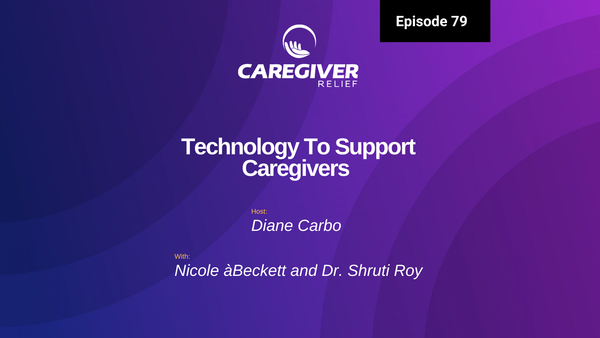100 Invaluable Dementia Caregiver Tips
Caregiver Relief offers practical approaches and collective knowledge from both family caregivers and medical professionals for caring for someone with dementia. Learn about the pitfalls of the medical delivery system and how to identify long and short-term goals.

"100 Invaluable Dementia Caregiver Tips" is a culmination of years of experience working with families facing the challenges of dementia caregiving. At Caregiver Relief, our mission is to provide you with practical insights, guidance, and support throughout your caregiving journey. From the earliest signs of forgetfulness to the end stages of the disease, we offer a wealth of knowledge from diverse perspectives, combining the wisdom of family caregivers and medical professionals.
Recognizing Your Expertise: Through our extensive work with family caregivers, we've come to recognize that you are the true experts in dementia caregiving. Medical professionals often lack the profound understanding required to care for someone with dementia. As the saying goes, "Those that know, DO." Our platform exists to help you navigate the complexities of the medical system, shedding light on potential challenges and pitfalls so that you can prepare for the future.
Setting Long and Short-Term Goals: Allow Caregiver Relief to assist you in identifying both your long-term and short-term caregiving goals. We understand that your journey is filled with numerous responsibilities, and we aim to help you find balance while prioritizing your own well-being alongside that of your loved one.
Sharing Knowledge: We encourage you to share your caregiving experiences on our platform, as your insights can greatly benefit others on a similar journey. Together, we can create a supportive community of caregivers who understand the unique challenges and triumphs you face.
Did You Know? Here are some crucial facts that every dementia caregiver should be aware of:
1-10: Essentials of Dementia Care:
- Stress and Health: Research shows that 50% of family caregivers experience severe health issues due to stress before their loved one passes away.
- Doctor Awareness: Most family doctors lack expertise in dementia; you may become the primary expert.
- Life Amidst Caregiving: There may come a time when you envy friends with deceased parents for the freedom they enjoy.
- Diverse Dementia Types: Understand that there are various forms of dementia, and your family member may not have the correct diagnosis.
- Medication Consistency: Some dementia medications lose effectiveness if stopped and restarted.
- Insurance Challenges: Medicare and Medicaid may not cover many dementia-related costs.
- Doctor's Role: A skilled doctor can prevent crises and address problems effectively.
- Finding the Right Doctor: Learn how to find a doctor experienced in dementia care.
- Self-Care: Remember that life exists beyond caregiving, and it requires daily attention.
- Understanding Behavior: Don't be embarrassed by your parent's actions; it's the disease, not the person.
11-20: Navigating Daily Life:
11. Problem Solving: There's a solution for every issue; stay open to opportunities.
- Caregiver's Daily Routine: Juggling various responsibilities can feel overwhelming; prioritize self-care.
- Long-Distance Care: Develop systems for long-distance caregiving.
- Support Groups: Join caregiver support groups for knowledge and camaraderie.
- Deceptive Appearances: Sometimes, dementia patients hide cognitive deficits, leading to disbelief from others.
- Early Detection: Catching changes early can significantly impact treatment.
- Encourage Independence: Encourage your loved one to do as much as possible for as long as possible.
- Exploring Alternatives: Understand the available care options.
- Family Dynamics: Dementia can strain family relationships; manage communication sensitively.
- Safety Balance: Balance allowing independence with avoiding potentially dangerous situations.
21-30: Managing Challenges:
21. Managing Disappointments: Family and friends may disappoint you; acknowledge and let go.
- Asking for Help: Don't hesitate to ask for specific help; it's necessary.
- Overcoming Guilt: Work on overcoming guilt, as it negates the good you do.
- Grief Process: Understand the grieving process; it's normal to feel relief and sadness.
- Facing Death: Sometimes, there are situations worse than death; be prepared.
- Future Care Needs: Prepare for future care needs; research care facilities in advance.
- Dementia Care Facilities: Finding the right dementia care facility can be challenging.
- Sexual Activity: Be aware of the potential risks associated with sexual activity in dementia care settings.
- Getting to Know Staff: Understand the dynamics of care facilities and key staff members.
- Legal and Financial Preparedness: Ensure you have essential legal, medical, and financial documents in place.
31-40: Effective Communication:
31. Quality vs. Quantity of Life: Know your family member's preferences regarding preventive care and treatment.
- Handling Difficult Parents: Learn strategies for dealing with difficult parents.
- Sibling Dynamics: Address and manage conflicts with siblings effectively.
- Introducing End-of-Life Care: Know when to initiate end-of-life care discussions.
- Preferred End-of-Life Location: Determine your loved one's preferred location for their final days.
- Accepting Limits: Acknowledge your own limits and needs; you can't make everyone happy.
- Managing Energy: Learn how to conserve energy to meet family demands.
- Stress Testing: Perform stress and memory tests at home to monitor your well-being.
- Separating the Disease: Try to separate the person from the disease in your interactions.
- Laugh and Find Joy: Laughter is a potent medicine; don't hesitate to find joy in everyday moments.
41-50: Practical Caregiving Strategies:
41. Avoid Moving on Fridays: Avoid moving a loved one into a care facility on Fridays due to weekend staffing shortages.
- Review Long-Term Care Policies: Examine long-term care policies for cost-of-living adjustments and coverage details.
- Long-Distance Caregiving Systems: Establish systems for caring for a parent from a distance.
- Importance of Support Groups: Leverage support groups to equip yourself with knowledge and confidence.
- Things Aren't Always as They Seem: Some dementia patients adeptly conceal cognitive deficits, leading to disbelief from others.
- Early Detection's Impact: Catching changes early can significantly impact treatment effectiveness.
- Promote Independence: Encourage your loved one to do as much as possible for as long as possible.
- Resource Exploration: Familiarize yourself with available caregiving resources.
- Navigating Family Dynamics: Dementia can strain family relationships; manage communication sensitively.
- Balancing Safety and Independence: Balance allowing independence with avoiding potentially dangerous situations.

51-60: Emotions and Relationships:
51. Managing Disappointments: Recognize that family and friends may have limits; learn to let go.
- Seeking Specific Help: Don't hesitate to request specific assistance from others.
- Overcoming Guilt: Work on overcoming guilt, as it negates the good you do.
- Grieving Process: Understand the grieving process; it's normal to feel relief and sadness.
- Facing Death: Sometimes, there are situations worse than death; be prepared.
- Future Care Needs: Prepare for future care needs; research care facilities in advance.
- Dementia Care Facilities: Finding the right dementia care facility can be challenging.
- Sexual Activity Considerations: Be aware of the potential risks associated with sexual activity in dementia care settings.
- Getting to Know Facility Staff: Understand the dynamics of care facilities and key staff members.
- Legal and Financial Preparedness: Ensure you have essential legal, medical, and financial documents in place.
61-70: Effective Communication:
61. Quality vs. Quantity of Life: Understand your family member's preferences regarding preventive care and treatment.
- Dealing with Difficult Parents: Learn strategies for dealing with difficult parents.
- Navigating Sibling Dynamics: Address and manage conflicts with siblings effectively.
- Introducing End-of-Life Care: Know when to initiate end-of-life care discussions.
- Preferred End-of-Life Location: Determine your loved one's preferred location for their final days.
- Accepting Limits: Acknowledge your own limits and needs; you can't make everyone happy.
- Managing Energy: Learn how to conserve energy to meet family demands.
- Stress Testing: Perform stress and memory tests at home to monitor your well-being.
- Separating the Disease: Try to separate the person from the disease in your interactions.
- Laugh and Find Joy: Laughter is a potent medicine; don't hesitate to find joy in everyday moments.
71-80: Practical Caregiving Strategies:
71. Avoid Moving on Fridays: Avoid moving a loved one into a care facility on Fridays due to weekend staffing shortages.
- Review Long-Term Care Policies: Examine long-term care policies for cost-of-living adjustments and coverage details.
- Long-Distance Caregiving Systems: Establish systems for caring for a parent from a distance.
- Importance of Support Groups: Leverage support groups to equip yourself with knowledge and confidence.
- Things Aren't Always as They Seem: Some dementia patients adeptly conceal cognitive deficits, leading to disbelief from others.
- Early Detection's Impact: Catching changes early can significantly impact treatment effectiveness.
- Promote Independence: Encourage your loved one to do as much as possible for as long as possible.
- Resource Exploration: Familiarize yourself with available caregiving resources.
- Navigating Family Dynamics: Dementia can strain family relationships; manage communication sensitively.
- Balancing Safety and Independence: Balance allowing independence with avoiding potentially dangerous situations.

81-90: Physical and Emotional Well-being:
81. Maintaining Emotional Health: Keep a gratitude journal and practice mindful living for improved well-being.
- Stress Relief Techniques: Learn stress-relief techniques to maintain optimal health.
- Preparing for Life After Caregiving: Plan for your life after caregiving; it requires preparation.
- Focus on Capabilities: Focus on what your loved one can do, not what they can't.
- Handling Anger: Understand that anger can be directed at the situation, not the person with dementia.
- Living in Their Reality: Embrace your loved one's reality instead of trying to reorient them.
- Understanding Their Feelings: Try to understand your loved one's emotions; they may struggle to express themselves.
- Advocating in Medical Settings: Advocate for your loved one effectively in medical settings.
- VA Benefits: Explore the benefits available to you through the Veterans Administration.
- Dealing with Eating Challenges: Address eating challenges if your loved one loses interest in food.
91-100: Daily Care and Observations:
91. Handling Oral Fixation: Address concerns when your loved one puts everything into their mouth.
- Identifying Pain: Learn to identify signs of pain in a person with dementia.
- Managing Meal Times: Address situations where your loved one forgets to eat or drink.
- Kitchen Safety: Ensure kitchen safety, especially if your loved one enjoys cooking.
- Coping with Deceptive Behavior: Some dementia patients become skilled at masking memory loss and judgment.
- The Power of Laughter: Embrace laughter and joy daily to maintain positive energy.
- Moving on Fridays: Avoid moving into care facilities on Fridays due to staffing challenges.
- Understanding Long-Term Care Policies: Review long-term care policies for coverage details.
- Maintaining Long-Distance Care: Establish effective systems for remote caregiving.
- The Importance of Support Groups: Join caregiver support groups to equip yourself with knowledge and confidence.
Remember that each caregiver's journey is unique, and it's essential to tailor these tips to your specific situation. Your dedication and love make a significant difference in the life of your loved one with dementia.
You might also like this article:









